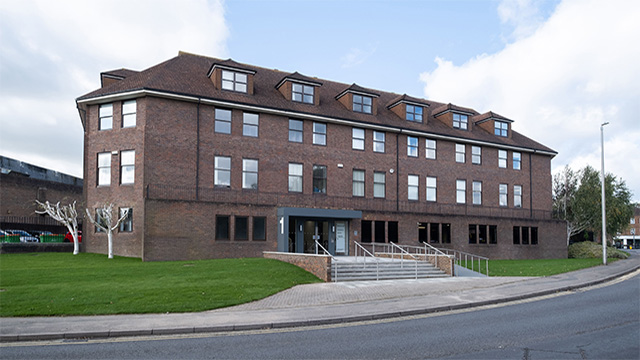The EG Interview: Bruntwood SciTech – fighting on the Covid-19 frontline
Like many other proud property bosses, Bruntwood SciTech chief executive Phil Kemp thinks his business is unique. Hands-on. Unusual, even. But this time, it doesn’t sound like Kemp is reading out of a corporate buzzword thesaurus when he makes these claims.
During this global crisis, Bruntwood SciTech really has played the most unique, hands-on and unusual role in helping the country battle one of the most destructive pandemics the world has seen in modern times.
Soon after lockdown was ordered, the company was in a race against time to repurpose existing space located at its Alderley Park life sciences campus in Cheshire into one of three national hubs dedicated to investigating Covid-19.
Like many other proud property bosses, Bruntwood SciTech chief executive Phil Kemp thinks his business is unique. Hands-on. Unusual, even. But this time, it doesn’t sound like Kemp is reading out of a corporate buzzword thesaurus when he makes these claims.
During this global crisis, Bruntwood SciTech really has played the most unique, hands-on and unusual role in helping the country battle one of the most destructive pandemics the world has seen in modern times.
Soon after lockdown was ordered, the company was in a race against time to repurpose existing space located at its Alderley Park life sciences campus in Cheshire into one of three national hubs dedicated to investigating Covid-19.
In just three weeks, two floors in one of the campus’s buildings were turned into testing facilities, where up to 50,000 live samples of virus pass through every day.
“It’s been a challenge, but it’s been very exciting,” says Kemp. “The Army has been delivering quite a lot of equipment, and it’s been quite a broad group of people working on this in the national interest.”
Not a bad effort for a company that launched less than two years ago.
Bruntwood SciTech was established in October 2018, when Bruntwood and Legal & General thought it would make more sense to storm the life sciences and tech sectors together, instead of constantly bumping into each other at local authorities around the country. The 50:50 joint venture saw the partners invest £360m of capital, property and intellectual assets into the new company.
The newly formed partnership has had a lot to deal with, launching at a time when the UK was in the painful process of extracting itself from the EU, and now having to deal with a global pandemic when life sciences and tech has never been more important. It is for this reason Kemp is convinced Bruntwood SciTech will come out of lockdown stronger than ever.
Firefighting coronavirus
The reason Bruntwood SciTech is unusual, Kemp explains, is that it has a singular focus on the life sciences and tech sectors, zooming in specifically on establishing science parks and innovation districts. It means the company has been able to gather the knowledge needed to respond quickly and efficiently to the government demand for specialised coronavirus research hubs.
“If we had just been providing offices, then we would have been dead in the water,” Kemp says. “Because we had this facility at Alderley Park, and we’ve been involved in delivering lab and office space to science customers for five years, we have the special capability to talk to the Medicines Discovery Catapult [the body instructed by government to develop a quick and efficient response to health secretary Matt Hancock’s target of carrying out 100,000 Covid-19 tests a day], government and scientists to make sure what was built could actually help them deliver up to 50,000 samples.”
Where other sectors of real estate have struggled through the lockdown – retail and leisure in particular – Kemp says it has posed different challenges for the business. This is mainly because the life sciences sector (and, to an extent, the tech sector) has had to continue operating on-site through lockdown.
Bruntwood SciTech has provided extra office space at Alderley Park for companies that can’t work from home as they are lab based, but need extra space to adhere to social distancing rules. The logistics of organising this, Kemp says, have been a challenge. “Our tough time has been tough for different reasons.”
Another challenge has been navigating through the delays to development that lockdown has posed. Bruntwood SciTech currently has 1m sq ft of schemes under construction which have suffered delays as a result of Covid-19. This has not been helped by the confusion caused over whether sites should stay open or closed during lockdown.
“Every business has been impacted, at least for a certain number of months, by what has been happening,” Kemp says. “Because the initial advice related to construction sites wasn’t 100% clear, we had some contractors that immediately left site and some stayed on.
“We’re now at a point where everyone is observing the right guidance in terms of social distancing, but we’re not at 100% capacity where we were before Covid-19. We’re active on all of our sites but as a result it has slowed us down.”
[caption id="attachment_962590" align="aligncenter" width="847"] Alderley Park[/caption]
Ambitious plans
When Bruntwood and L&G launched the scitech jv, an ambitious plan was set in motion to grow its amalgamated 1.3m sq ft portfolio into a 6.2m sq ft, £1.8bn portfolio over the next 10 years.
But with a predicted global recession looming, will these plans change at all?
Kemp remains bullish that the company will achieve this goal – and this ambition hasn’t changed. He does, however, expect some opportunities to be delayed, such as the University of Manchester’s £1.5bn ID Manchester scheme.
Bruntwood SciTech is one of four bidders remaining for the role of development partner, but procurement has been put on ice throughout the pandemic. “Has it diminished our ambition? Absolutely not,” he says.
This is one example of Bruntwood SciTech’s strategy of joining up with Russell Group universities to create innovation hubs in the UK’s key city regions, from Glasgow and Edinburgh in Scotland to London in the South, Bristol in the South West and Newcastle in the North East.
“From our perspective, we’ve done an analysis of all the Russell Group universities – what their strengths and weaknesses are. We know there are other OJEU processes in Edinburgh in the future, and our focus absolutely is that we never want to do this by ourselves; we want to do this as a partnership.”
Kemp won’t say exactly which universities he is targeting, but says Bruntwood SciTech will be opportunistic in its real estate strategy. “To a large extent, we’re driven by opportunities and when those opportunities become available,” he says.
Batting off competition
It is this process of fully integrating the business into key city regions that is central to Bruntwood SciTech’s success, says Kemp. And it is these relationships that will stand the company in good stead against international competition eyeing up the UK’s life sciences sector.
Coronavirus has created a general pick-up in demand, according to experts in the field. Savills research director Steven Lang says interest has been shown from big investors, global funds and US life sciences REITs.
“There could be millions of square feet of pent-up demand that will be created just in the UK as a result of corporate deals and life sciences interest generally,” he says.
This will no doubt grow under a renewed interest from government in the lucrative life sciences and tech industries. In the most recent Budget, chancellor Rishi Sunak increased R&D spending by 15% for next year, ultimately pumping 2.4% of the UK’s GDP into the sector by 2027, up from 1.7%.
With international property players circling the UK, Bruntwood SciTech might have to fend off investors hungry to tap into these opportunities.
“Before the pandemic we had definitely seen interest, and it’s not just from the US, it’s global. There are companies in Europe and even further afield in China that have expressed an interest in getting into real estate ownership in these science and technology sectors,” Kemp says, referencing BioMed Realty and Alexandria Real Estate Equities as two such competitors that have tried previously to crack the UK.
“Both of those companies have tried in the past and haven’t really properly established a foothold in the UK, but that doesn’t necessarily mean they might not try again in the future,” he says.
But it is the relationships that Bruntwood SciTech has with the UK’s biggest universities, city councils and NHS trusts that Kemp says will help keep it on top.
“Unlike other businesses, like rolling out a Starbucks or McDonald’s franchise, this isn’t a one size fits all,” he says. “Every city is different, every university is different, every cluster of tech clusters is different, and that’s why I talk about the partnerships being critical to this.
“If you don’t set up a partnership in an innovation district, you can’t create the right kind of environment for the innovation district to thrive… without that, you can’t be successful in this space.”
It is the strength of the UK’s growing life sciences and tech sectors, their desirability to international competition and the critical role they have played in firefighting Covid-19 that make Kemp adamant Bruntwood SciTech made the right decision taking on this field together with L&G.
“What this has illustrated is that the strategic decision we took 18 months ago was absolutely the right thing to do,” he says.
He urges the government, however, to keep its word on the commitment to R&D spending it made in the Budget to ensure that the sector continues to thrive post-lockdown.
“Government was talking about increasing R&D spending to 2.4% of GDP, and the key thing to me is making sure that, as we come out of lockdown and move through 2020 into 2021, this investment continues so that we are prepared for more versions of coronavirus in the future,” he says. “We need to focus on tech and life sciences, and the role that the sectors will play dealing with not just a post-Brexit world, but a post-Covid-19 world.”
To send feedback, e-mail lucy.alderson@egi.co.uk or tweet @LucyAJourno or @estatesgazette











